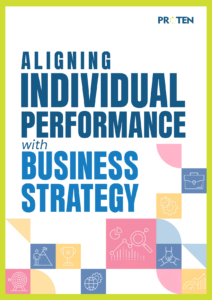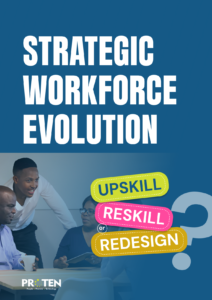With the rise of new technologies and shifting workplace trends, skills gaps keep widening, employees expect more, and the fight for top talent gets tougher every day.
In times like these, neglecting employee development and retention strategies only sets you back. because talent management has become a core business priority, one that shapes performance, drives growth, and secures long-term success.
In this blog, we’ll break down what talent management is, why it matters for both organizations and employees, the risks of neglecting it, and the strategies that make it effective.

What is Talent Management
Talent management is a strategic approach to HR that focuses on attracting, developing, engaging, and retaining high-performing employees to meet both current and future business needs.
Unlike traditional HR, which is largely administrative and reactive, talent management integrates recruitment, development, engagement, retention, and succession planning into a proactive system aligned with organizational strategy.
Why Talent Management Matters for Organizations
Talent management plays a central role in an organization’s growth and long-term success. A strong strategy improves performance, reduces costs, builds leadership pipelines, and enhances the company’s reputation as an employer of choice.
When employees are recruited with care, developed through training, and supported with opportunities to grow, they become more productive, innovative, and engaged. This creates an agile workforce that can adapt to market changes and drive business results.
Retention is another major advantage. High turnover drains resources, but organizations that invest in their people see greater loyalty and lower hiring costs. Preserving institutional knowledge and maintaining a stable workforce strengthen overall efficiency.
Leadership continuity is also secured through succession planning. By identifying high-potential employees and preparing them for greater responsibility, organizations ensure smooth transitions and avoid gaps in critical roles.
Finally, effective talent management strengthens the employer brand. Companies known for valuing and developing their people attract top talent, creating a positive cycle that reinforces competitiveness and industry leadership.
📌Free Resource for HR Leaders
Hiring a senior leader is one of the riskiest decisions your business will ever make. The C-Suite & Senior Role Recruitment Checklist gives you a step-by-step framework to reduce risks, secure culture fit, and onboard leaders for long-term success.
Download your free checklist here
Benefits of Talent Management for Employees
Talent management benefits employees as much as it does organizations by creating an environment where people feel supported, valued, and given the tools to succeed. This turns work into a space for growth and fulfillment, not just a paycheck.
Recent insights from our Managing Director, Deborah Yemi-Oladayo, published in BusinessDay, highlight this shift clearly. She notes that Gen Z and soon, Gen Alpha, are walking away from jobs that offer only a pay cheque.
For them, work is not just about earning; it’s about meaning, contribution, and alignment with personal values.
This reality reinforces why talent management must prioritize not just salaries and benefits, but also purpose, growth opportunities, and an inclusive culture.
Another key advantage is clear career development. Structured programs such as mentorship, continuous learning, and personalized development plans help employees build new skills and see a path forward. Knowing how they can progress motivates them to stay and perform at their best.
This also drives stronger engagement. When employees see their contributions recognized and their future taken seriously, they feel more connected to the organization and their colleagues. This sense of purpose makes work more enjoyable and reduces the desire to look elsewhere.
Fair and transparent reward systems are another benefit. Recognition, merit-based advancement, and equitable compensation reassure employees that their efforts matter, fostering trust and a culture of high performance.
Lastly, modern talent management extends to employee well-being. Flexible work options, wellness programs, and mental health support show genuine care for individuals, building loyalty and creating a workforce that is both resilient and committed.
Challenges Organizations Face Without Talent Management
As our MD explained in her BusinessDay article, younger workers are unafraid to leave roles that don’t align with their values, even when pay is competitive.
For employers, this means that retention is no longer secured by compensation alone. Without a strong talent management strategy that offers meaning, growth, and alignment, organizations will continue to face costly resignations and struggle to keep their best talent.
Without a strategic approach to talent management, organizations often encounter serious issues, including:
- High turnover and recruitment costs – Constant rehiring drains resources, reduces productivity, and disrupts team stability.
- Low employee morale and disengagement – Lack of recognition or growth opportunities leaves employees unmotivated and less committed to company goals.
- Skills gaps that hinder growth – Without development and succession planning, companies fall behind as technologies and market demands evolve.
- Difficulty attracting top talent – Skilled candidates prefer organisations that invest in their people, leaving less competitive companies struggling to recruit and retain talent.
Strategies for Effective Talent Management
To build a sustainable, high-performing workforce, organizations need deliberate strategies that treat people as a core asset. Key approaches include:
- Align talent management with business strategy – Link recruitment, development, and succession planning to long-term goals by focusing on the skills and roles critical for future growth.
- Invest in employee learning and development – Provide training, mentorship, and upskilling opportunities to boost performance today and prepare employees for future challenges.
- Foster a culture of feedback and recognition – Use regular check-ins and real-time feedback instead of relying only on annual reviews. Pair this with consistent recognition to keep employees motivated and engaged.
- Leverage technology and HR analytics – Track metrics like engagement, turnover, and skills gaps to make data-driven decisions and address issues before they escalate.
- Implement fair performance management systems – Ensure promotions and rewards are based on merit with transparent, unbiased evaluation processes that build trust and drive high performance.
- Promote diversity, equity, and inclusion (DEI) – Actively attract diverse candidates and foster an inclusive culture where everyone can thrive, sparking greater creativity and innovation.
Future Trends in Talent Management
The field of talent management is rapidly evolving, driven by technological advancements, changing workforce expectations, and new work models.
As organizations look to the future, they are adapting their strategies to remain competitive and meet the needs of a modern workforce.
Several key trends are shaping how companies will attract, develop, and retain talent in the coming years.
1. Role of AI and automation in HR processes:
Artificial intelligence and automation are transforming HR from an administrative function into a strategic one.
AI-powered tools are now used to streamline repetitive tasks like resume screening, interview scheduling, and data entry, freeing up HR professionals to focus on more complex, human-centered work.
Predictive analytics, a key feature of AI, also helps identify skill gaps, predict turnover risks, and personalize learning and development paths for employees.
2. Focus on employee experience and wellbeing:
Organizations are increasingly recognizing that a positive employee experience is crucial for retention and productivity.
Future talent management strategies will prioritize the holistic well-being of employees, including mental and physical health.
This trend involves creating personalized experiences, providing comprehensive wellness programs, and fostering a culture that supports work-life balance and psychological safety.
3. Hybrid/remote workforce talent strategies:
The rise of hybrid and remote work models has fundamentally changed how companies manage talent. Organizations must now develop strategies to engage and develop employees who work both in-person and remotely.
This includes creating equitable opportunities for all employees, regardless of location, ensuring seamless communication and collaboration, and rethinking performance management to focus on outcomes rather than hours spent in the office.
This shift also broadens the talent pool, allowing companies to recruit from anywhere in the world.
4. Data-driven decision making in HR:
The future of talent management is rooted in data. By leveraging HR analytics, companies can move away from relying on intuition and make more informed, evidence-based decisions.
Data on everything from employee engagement to recruitment sources and performance metrics can be analyzed to identify trends, pinpoint areas for improvement, and measure the effectiveness of various talent initiatives.
This data-centric approach allows for more precise and impactful talent strategies.
Conclusion
Talent management is key to building resilient, high-performing organizations. It not only drives business success but also builds loyalty, engagement, and satisfaction among employees.
As our Managing Director, Deborah Yemi-Oladayo, notes, “the best of Gen Z and Alpha won’t just quit for better offers; they’ll quit without a next job lined up, confident in their ability to freelance, build startups, or join global remote teams whose missions match their values.”
This reality makes it clear: pay alone is no longer enough. Companies must offer purpose, growth, and alignment if they want to keep their best people.
Now is the time to refine your talent management strategy and build a system that supports both employees and long-term business success.














